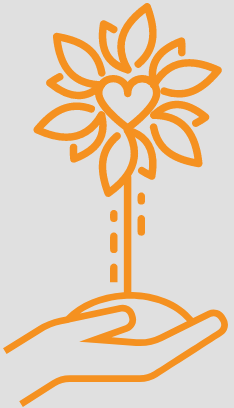EDCare Omaha, we understand the complexities of anorexia nervosa, an eating disorder that deeply affects individuals’ relationships with their bodies and food. Our dedicated team in Omaha is committed to providing specialized and comprehensive care, tailored to empower individuals on their journey to overcome the challenges of anorexia.
Customized Anorexia Treatment Programs at EDCare Omaha
Anorexia nervosa can have profound physical and emotional consequences, impacting individuals in various aspects of their lives. At EDCare Omaha, we prioritize understanding the unique circumstances and experiences of each individual, shaping our treatment programs to address the underlying factors contributing to the development and perpetuation of anorexia. By focusing on the whole person, we aim to provide comprehensive support and guidance throughout the recovery process.
We help patients recover at every level – mind, body and spirit. Contact us below to schedule a free clinical assessment.
Meet Our Omaha Anorexia Treatment Specialists
Our Anorexia Treatment Process at EDCare Omaha
Understanding your options for anorexia treatment is crucial for embarking on the path to recovery. Our compassionate team of eating disorder professionals in Omaha is dedicated to providing unwavering support at every step. During your initial assessment, our Assessment Clinicians will collaborate closely with you to determine the most suitable level of care, ensuring that your treatment plan is tailored to meet your specific needs and circumstances.
Explore our specialized anorexia treatment programs at EDCare Omaha, designed to provide you with the compassionate care and support you need to achieve lasting recovery and improved well-being.
Levels of Care for Anorexia Treatment and Recovery
Anorexia Nervosa, like all eating disorders, is a serious mental illness. Learning about your anorexia treatment options, finding the right level of care, and being admitted under the right program can mean the difference between life and death.
EDCare is home to compassionate eating disorder professionals who will walk you through your path to recovery. During your initial assessment, one of our Assessment Clinicians will help you identify the appropriate level of care, based on your needs.
Let’s take a deeper look at our unique anorexia treatment programs, so you can better understand what to expect if you admit to one of our programs.
EDCare’s Partial Hospitalization Program (PHP) is the highest level of care you can receive at EDCare for the treatment of anorexia. This program is ideal if you feel that you do not require the supervision provided in residential or inpatient programs, but require more support than what regular outpatient therapy can provide.
What makes EDCare’s PHP unique? We have designed this inclusive program specifically for adults, ages 18 and older. In other programs, patients meet with their treatment team only four to five days a week, but with EDCare’s highly structured PHP, you meet with your team seven days a week. You will also receive 10 hours of program support from Monday through Friday, with reduced hours on weekends. Local patients often return home after program hours. For patients who live out of town or need additional after-hours support, we offer housing at our apartment in Kansas City and Connections House in Denver.
Our Intensive Outpatient Program (IOP) builds the foundation for long-term recovery from anorexia. In this program, you will begin to practice the skills you have acquired from PHP. While you will be applying these skills independently, you will still receive structured clinical support.
EDCare’s IOP is a gender-inclusive program for individuals ages 18 and above, offered at both our Denver and Kansas City treatment centers. We believe the skill you gain in PHP are essential to your long-term recovery and for this reason, we do not direcly admit individuals into our Daytime IOP.
Our Evening Intensive Outpatient Program (EIOP) is for those who need comprehensive support, but may be unable to seek a higher level of care because they work full-time, are in school, or have other responsibilities. EIOP is for adults ages 18 and older and is available at our eating disorder treatment centers at Denver, Kansas City, Colorado Springs, and Omaha. EIOP gives you four hours of program support Monday through Thursday. Under this program, you will learn to disrupt unproductive behaviors, face your fears, and tackle new challenges.
EDCare’s Adolescent Intensive Outpatient Program (AIOP) is available in our Colorado Springs eating disorder treatment center and is similar to our adult EIOP. The difference is, this program is tailored for teenagers ages 14-17. The patient’s family is also encouraged to take on an active role in their loved one’s treatment plan. AIOP easily fits into a teen’s schedule and lifestyle, with its evening programming. This allows them to attend school while learning skills essential to coping with anorexia.
Recovery from anorexia nervosa is possible. Ongoing support and access to recovery resources through our Outpatient and Aftercare Services will help you maintain success long-term.
Treatment Modalities
At EDCare, we understand that each patient faces unique challenges and goals. We use the following treatment modalities to help you achieve sustained recovery.

EDCare offers help for a number of different conditions.
What is Anorexia Nervosa?
Anorexia nervosa, more commonly known as anorexia, is an eating disorder characterized by the obsession with body shape, weight, and food intake that leads to self-imposed starvation.
To prevent themselves from gaining weight or to continue losing weight, individuals with anorexia will resort to severe food intake restriction and/or over exercise. Some people with anorexia may eat regular meals or even engage in binge eating, only to purge later. They may also refuse to change disordered eating behaviors or to be admitted to anorexia nervosa treatment centers. Without a proper anorexia treatment plan, a person with anorexia may reach a point where they still perceive themselves as fat despite being significantly underweight.
While anorexia is most distinguished by irregular eating behaviors, it involves factors beyond food. Its symptoms are attempts to cope with emotions that are seemingly unmanageable by achieving control and perfectionism, at least over the body and appetite. For those living with anorexia, the feeling of self-worth comes from the ability to reach their goal of losing weight.




